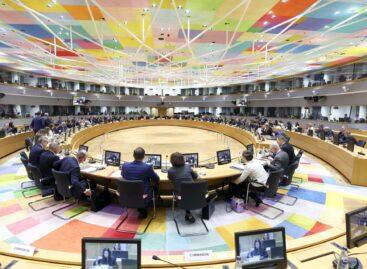Brussels must further reduce the administrative burden on farmers
Hungary has put forward a total of 45 proposals to the Belgian Presidency of the EU in order to reduce the administrative burdens of farmers, the strict regulations and the controls, Zsolt Feldman, the State Secretary responsible for agriculture and rural development of the Ministry of Agriculture, stated in Brussels on Monday.

(Photo: AM)
At the press conference following the meeting of the agriculture ministers of the EU member states, the state secretary drew attention to the fact that farmers’ demonstrations had to take place in 18 member states in order to finally be able to meaningfully discuss the reduction of administrative burdens affecting Hungarian and European farmers. As he said, hundreds of proposals from the member states regarding this issue were received at the council meeting, and the most important task for Hungary is to get most of the proposals accepted by the European Commission this year, so that they can be implemented on time. Zsolt Feldman pointed out that high production costs compared to income, Ukrainian imports that put farmers in a difficult situation, problems of agricultural profitability at the European level, with conditions limiting production and bureaucratic verification of their performance, created a difficult situation in the agriculture of the European Union. As a result of these, protests and farmer demonstrations became more frequent all over Europe, which brought results: they created an opportunity to start negotiations on easing the burdens and administrative tasks affecting farmers. “This is the psychological moment when all the European Ministers of Agriculture are trying to actually achieve the relaxation of the European Union’s agricultural rules. If we have eased the rules, then we can ease the administrative burden, this gives farmers the opportunity to in this current, indeed difficult throughout Europe situation, they should be able to concentrate on their well-being and not have to spend their everyday lives with the administration,” said the state secretary. Regarding the concern of the protesting farmers, among other things, that they may be at a competitive disadvantage due to the influx of cheap agricultural products from outside countries, Zsolt Feldman stated that while European farmers produce under strict regulations, these rules apply to products imported from outside the EU. do not apply. “Outside the EU, producers can use pesticides that are no longer available in the EU, or they can produce with a method that is already prohibited in the EU, all of which leads to an unacceptable competitive disadvantage. Brussels must stand up for farmers and he has to see that the expectations he sets for a European farmer should be the same for those outside the EU. This is good for agriculture and the consumer as well, as they get safe food,” Zsolt Felman pointed out.
The Secretary of State met with the participants of the farmers’ demonstration in Brussels and with representatives of several European farmers’ organizations
As he said, European farmers are struggling with the same problem, so uniform European solutions to their concerns must be found. “Hungary is extremely active in the search for European solutions. We have already taken steps at home, but now it’s Brussels’ turn, as European rules and trade agreements must be handled at the EU level,” underlined the State Secretary of the Ministry of Agriculture.
MTI
Related news
Not a turnaround, but consolidation: an agricultural outlook for 2026
🎧 Hallgasd a cikket: Lejátszás Szünet Folytatás Leállítás Nyelv: Auto…
Read more >Ministry of Agriculture: the government is supporting the development of crop dryers with significant resources
🎧 Hallgasd a cikket: Lejátszás Szünet Folytatás Leállítás Nyelv: Auto…
Read more >The guarantee of support for farmers is the preservation of an independent, autonomous agricultural policy
🎧 Hallgasd a cikket: Lejátszás Szünet Folytatás Leállítás Nyelv: Auto…
Read more >Related news
Amikor a megszámlálhatatlan megszámlálhatóvá válik
🎧 Hallgasd a cikket: Lejátszás Szünet Folytatás Leállítás Nyelv: Auto…
Read more >








